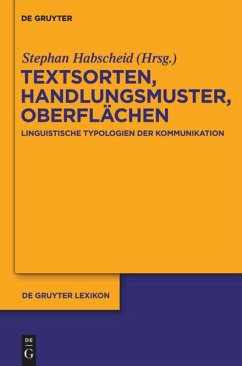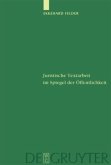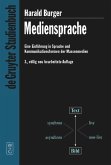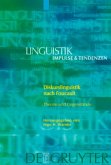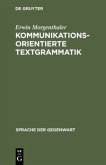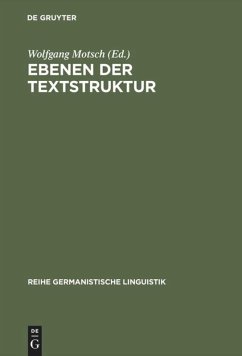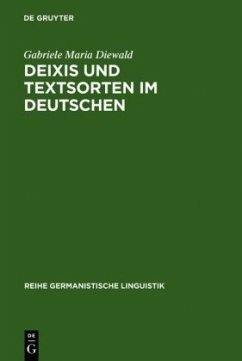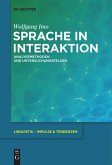This handbook presents the central concepts, theories and methods of text linguistics and describes the different sorts of text, primarily from a functional perspective. The description is not restricted to the communication typologies of exemplars of fields of activity - incl. medicine, politics, law, and the mass media, but also presents selected areas of application, such as creative writing, foreign language learning and intercultural communication. The handbook is a standard work for text linguistics and provides students and linguists with a comprehensive overview of the present state of research.
Seit den Anfängen der Textlinguistik in den 1960er Jahren werden Probleme der Texttypologie als wesentliches Element dieser Teildisziplin erachtet. Mit der Öffnung der Sprachwissenschaft zur verstehenden Sozialforschung und sprachpsychologischen Kommunikationstheorie traten an die Stelle formaler Textklassen komplexe Sinn-Einheiten des Handelns und der Interaktion, die wesentlich von den sprachlichen Oberflächen her zu verstehen sind. Zu den aktuellen Forschungsthemen gehören: die Verarbeitung von Textsortenwissen in individuellen und kollektiven Produktions- und Rezeptionsprozessen; der Erwerb kommunikativer Praktiken; ihre Kulturspezifik und Historizität; die Vernetzung von Textsorten in institutionellen Handlungsfeldern; ihre Bedingtheit durch je spezifische mediale und situative Voraussetzungen; die temporäre ideologische Stabilisierung, aber auch die Dynamisierung und Hybridisierung kommunikativer Genres und ihres Marktwertes. Als Standardwerk für Studenten und Sprachwissenschaftler stellt das Handbuch die zentralen Konzepte, Theorien und Methoden der aktuellen Textsortenforschung dar und charakterisiert zentrale Ausschnitte des kommunikativen Repertoires der Gegenwart.
Seit den Anfängen der Textlinguistik in den 1960er Jahren werden Probleme der Texttypologie als wesentliches Element dieser Teildisziplin erachtet. Mit der Öffnung der Sprachwissenschaft zur verstehenden Sozialforschung und sprachpsychologischen Kommunikationstheorie traten an die Stelle formaler Textklassen komplexe Sinn-Einheiten des Handelns und der Interaktion, die wesentlich von den sprachlichen Oberflächen her zu verstehen sind. Zu den aktuellen Forschungsthemen gehören: die Verarbeitung von Textsortenwissen in individuellen und kollektiven Produktions- und Rezeptionsprozessen; der Erwerb kommunikativer Praktiken; ihre Kulturspezifik und Historizität; die Vernetzung von Textsorten in institutionellen Handlungsfeldern; ihre Bedingtheit durch je spezifische mediale und situative Voraussetzungen; die temporäre ideologische Stabilisierung, aber auch die Dynamisierung und Hybridisierung kommunikativer Genres und ihres Marktwertes. Als Standardwerk für Studenten und Sprachwissenschaftler stellt das Handbuch die zentralen Konzepte, Theorien und Methoden der aktuellen Textsortenforschung dar und charakterisiert zentrale Ausschnitte des kommunikativen Repertoires der Gegenwart.

